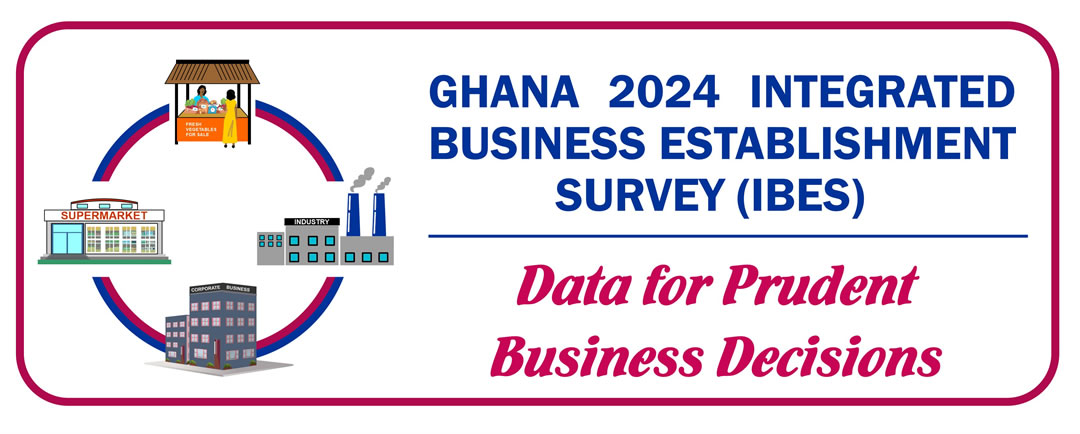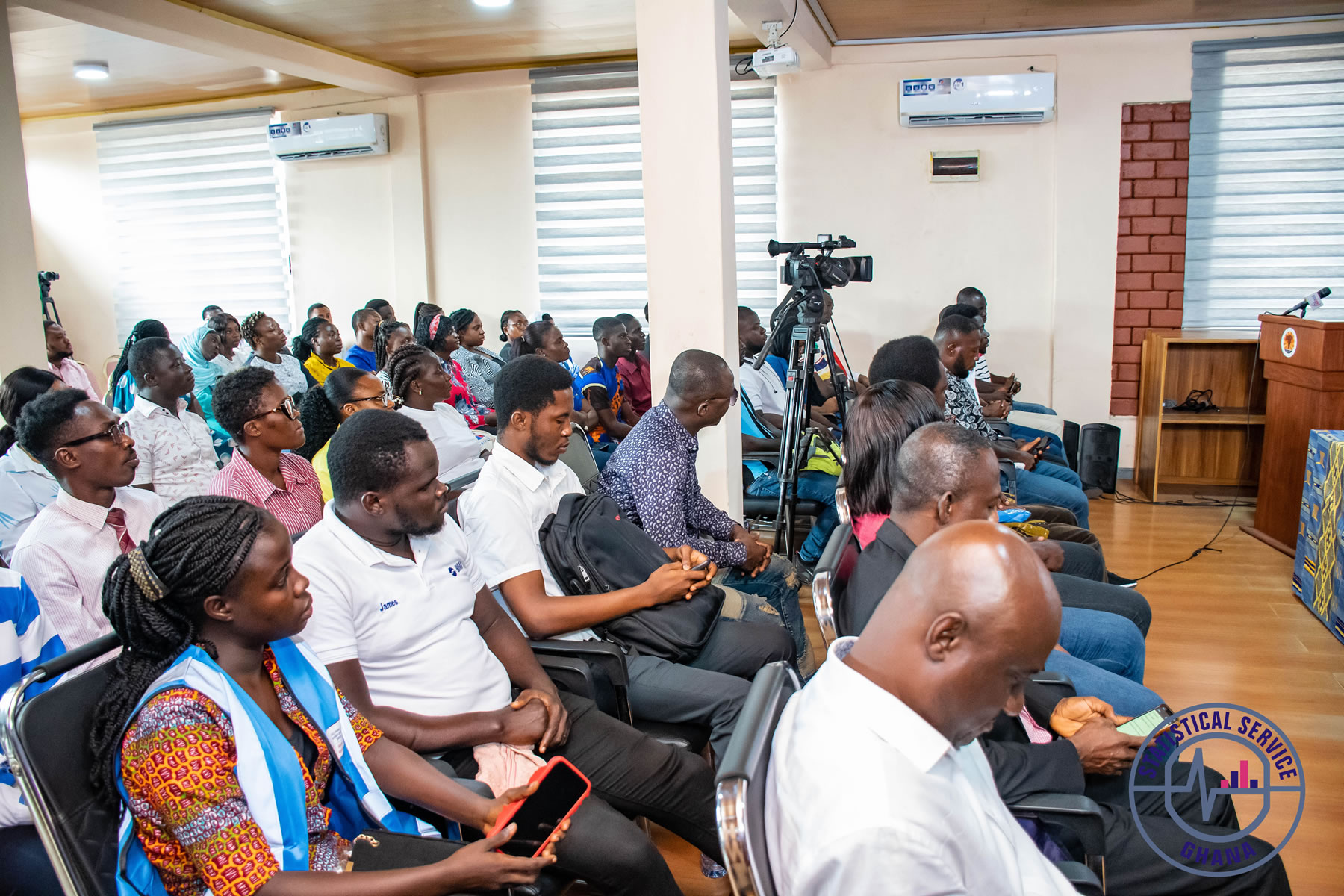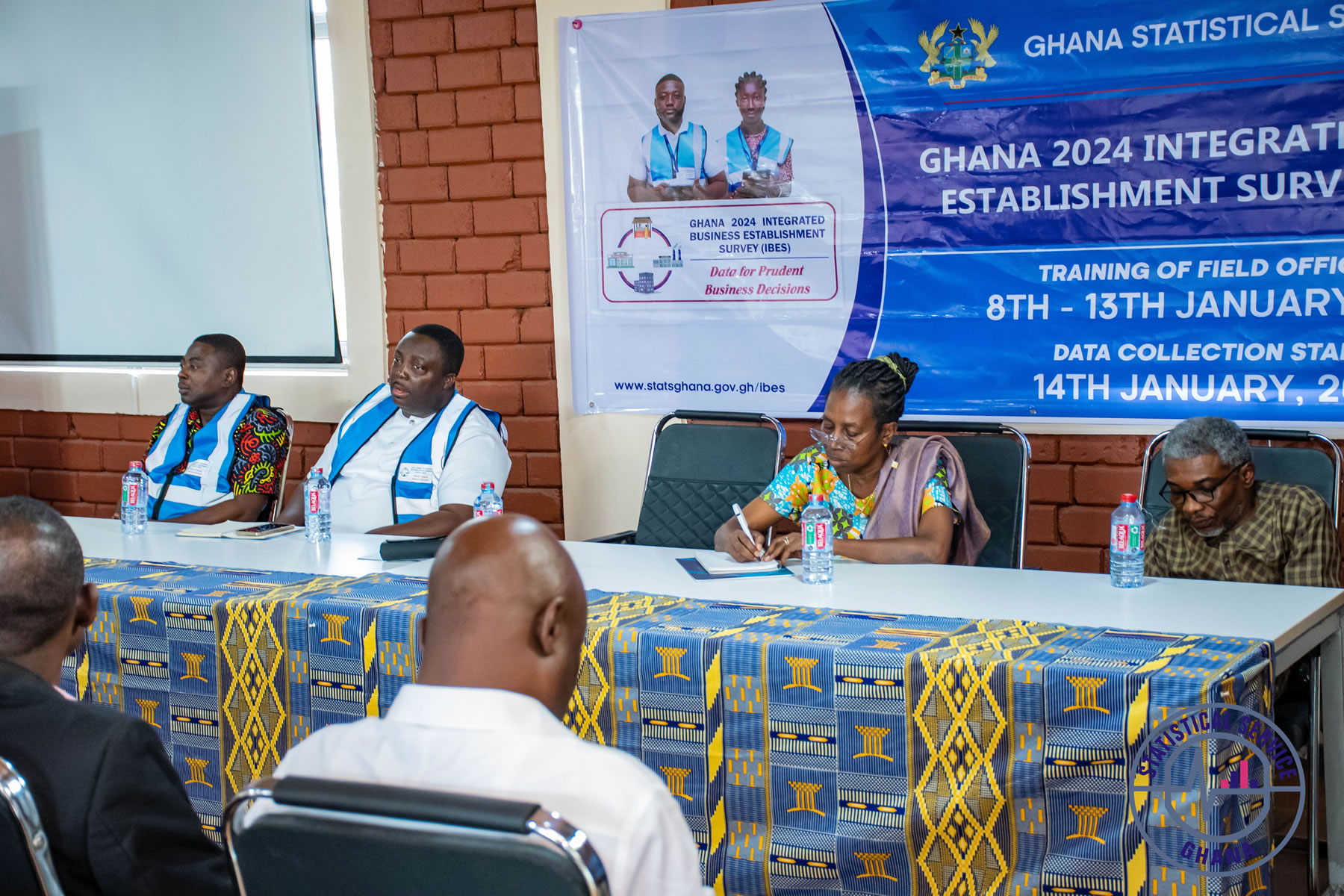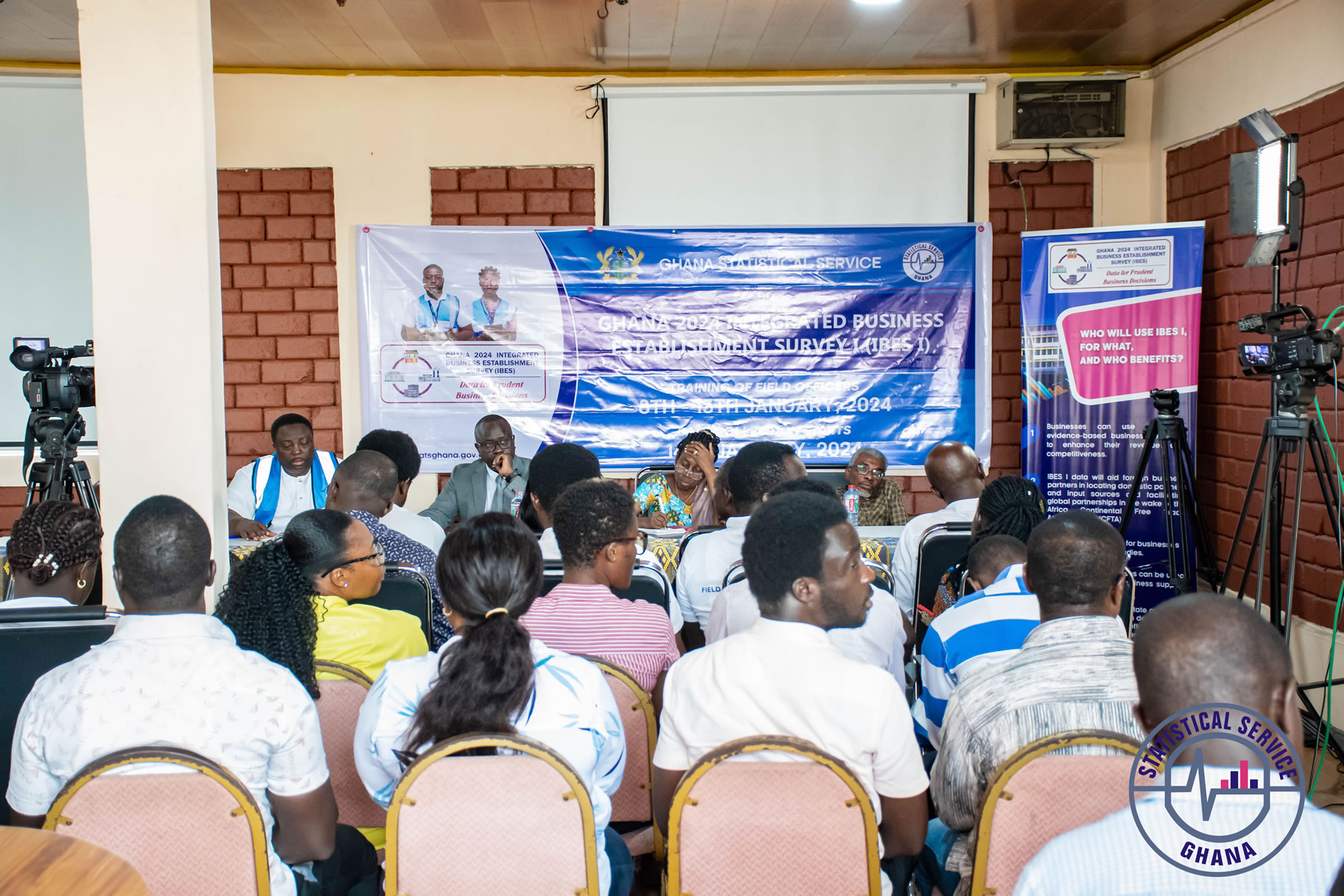The 2024 IBES I
The 2024 Ghana Integrated Business Establishment Survey (IBES) by the Ghana Statistical Service (GSS) will be the fourth conducted in Ghana. Previous economic censuses conducted were in 1987, 2003, and 2014, with the first two focusing only on the industry sector of the economy.
The Survey will be conducted in two phases, with Phase I focusing on a comprehensive list of all business units within the country. Thus, Phase I of the 2024 Ghana Integrated Business Establishment Survey (IBES I) is an economic census that seeks to enumerate ALL BUSINESS UNITS across all sectors of the Ghanaian economy. These targeted businesses are economic units that engage in legal activities, irrespective of status and size. Therefore, businesses that are for-profit or not-for-profit, large or small, in towns or villages, at physical locations or online, at markets, shops, offices or within residential facilities and all other locations, will be enumerated
Phase II of the 2024 Ghana Integrated Business Establishment Survey (IBES II) will precede IBES I, which will cover only selected establishments from the IBES I for more detailed information.
Check out these videos on IBES
Survey Info
The specific objectives of the 2024 Ghana IBES are to:
1) Build an updated online business register,
2) Update the categorisation of businesses,
3) Profile the distribution of businesses by their firmographics,
4) Access the worth of businesses, and
5) Determine changes in the structure of businesses over time.
1) Expanded scope to include businesses not in structures,
2) collection of geospatial data,
3) Automation of data collection processes, and
4) the addition of new modules on digital finance and environmental responsiveness.
2024 Ghana IBES I will provide updated data on:
1) Activities, locations, ownership, ages, and sizes of businesses to inform policy, planning, and monitoring of business growth and national development programmes.
2) The current structure of Ghana’s economy to facilitate the revision of key macroeconomic indicators including Gross Domestic Product (GDP), Producer Price Index (PPI), and the Index of Industrial Production (IIP).
3) Employment status of workers employed by businesses to help bridge the gap between the labour needs of firms and available skills resident in Ghana.
4) Characteristics of the informal sector to guide the development of policies aimed at formalising the economy and improving the welfare of workers in the sector.
The types of businesses targeted under the 2024 Ghana IBES I are, all:
1) Production units whose physical locations are fixed can be described and traced.
2) Stores/containers that are not used solely for domestic activities.
3) Fitting shops, fabrication shops, carpentry shops, block-making factories, etc.
4) Churches or temples, or mosques.
5) Public sector institutions.
6) Institutions (housed in a structure) engaged in agriculture and agriculture-related activities, usually called institutional agriculture, e.g., poultry farms, greenhouse farming etc.
7) Shops/stores/units of production which are visible or attached to the residential premise.
8) Businesses with signposts/ boards/ indications of business activities.
9) Shops in a complete structure (popularly called store) in the marketplace.
10) Stalls in the marketplace.
11) Educational institutions (both public and private)
12) Health facilities, e.g., hospitals/ clinics/ maternity homes.
13) Mobile businesses, e.g., hawkers
14) Businesses in open spaces, but usually operate from the same locations.
15) Businesses in residential structures.
16) Business units operating on small tables in the marketplace and neighbourhoods, sometimes covered with umbrellas, e.g., market sheds and momo agents on the tabletop, kenkey sellers on tabletops, and shoemakers on tabletops.
17) All business units operating under sheds in the marketplace and neighbourhoods, e.g., coconut sellers, animal (goat and dog) traders, etc.
18) Online businesses
The plan for IBES I involves visiting every:
1) Building or structure or shed and asking managers and business owners questions about their business operations.
2) Businesses in open spaces but operating from the same location, and asking them a few questions about what they do there.
3) Online business owners or operators and asking him/her a few questions about their operations.
4) Business, operating while in motion, and asking the owner or operator a few questions.
Management of the 2024 Ghana IBES
The Ghana Statistical Service is the implementation agency through the leadership of the Government Statistician and responsible for the day-to-day operations of the 2024 Ghana IBES.
A National Steering Committee (NSC) has been composed to provide strategic guidance and general oversight of 2024 Ghana IBES I and monitor activities to ensure successful implementation. The 2024 Ghana IBES I NSC comprises institutional representatives from;
1) Ministry of Finance,
2) Ministry of Trade and Industry,
3) Ghana Statistical Service,
4) Ghana Revenue Authority,
5) National Identification Authority,
6) National Development Planning Commission,
7) Ghana Enterprise Agency,
8) Association of Ghana Industries,
9) Ghana Union of Traders Association,
10) United Nations Industrial Development Organization
11) The World Bank.
The specific objectives of the 2024 Ghana IBES are to:
1) Build an updated online business register,
2) Update the categorisation of businesses,
3) Profile the distribution of businesses by their firmographics,
4) Access the worth of businesses, and
5) Determine changes in the structure of businesses over time.
1) Expanded scope to include businesses not in structures,
2) collection of geospatial data,
3) Automation of data collection processes, and
4) the addition of new modules on digital finance and environmental responsiveness.
2024 Ghana IBES I will provide updated data on:
1) Activities, locations, ownership, ages, and sizes of businesses to inform policy, planning, and monitoring of business growth and national development programmes.
2) The current structure of Ghana’s economy to facilitate the revision of key macroeconomic indicators including Gross Domestic Product (GDP), Producer Price Index (PPI), and the Index of Industrial Production (IIP).
3) Employment status of workers employed by businesses to help bridge the gap between the labour needs of firms and available skills resident in Ghana.
4) Characteristics of the informal sector to guide the development of policies aimed at formalising the economy and improving the welfare of workers in the sector.
The types of businesses targeted under the 2024 Ghana IBES I are, all:
1) Production units whose physical locations are fixed can be described and traced.
2) Stores/containers that are not used solely for domestic activities.
3) Fitting shops, fabrication shops, carpentry shops, block-making factories, etc.
4) Churches or temples, or mosques.
5) Public sector institutions.
6) Institutions (housed in a structure) engaged in agriculture and agriculture-related activities, usually called institutional agriculture, e.g., poultry farms, greenhouse farming etc.
7) Shops/stores/units of production which are visible or attached to the residential premise.
8) Businesses with signposts/ boards/ indications of business activities.
9) Shops in a complete structure (popularly called store) in the marketplace.
10) Stalls in the marketplace.
11) Educational institutions (both public and private)
12) Health facilities, e.g., hospitals/ clinics/ maternity homes.
13) Mobile businesses, e.g., hawkers
14) Businesses in open spaces, but usually operate from the same locations.
15) Businesses in residential structures.
16) Business units operating on small tables in the marketplace and neighbourhoods, sometimes covered with umbrellas, e.g., market sheds and momo agents on the tabletop, kenkey sellers on tabletops, and shoemakers on tabletops.
17) All business units operating under sheds in the marketplace and neighbourhoods, e.g., coconut sellers, animal (goat and dog) traders, etc.
18) Online businesses
The plan for IBES I involves visiting every:
1) Building or structure or shed and asking managers and business owners questions about their business operations.
2) Businesses in open spaces but operating from the same location, and asking them a few questions about what they do there.
3) Online business owners or operators and asking him/her a few questions about their operations.
4) Business, operating while in motion, and asking the owner or operator a few questions.
Management of the 2024 Ghana IBES
The Ghana Statistical Service is the implementation agency through the leadership of the Government Statistician and responsible for the day-to-day operations of the 2024 Ghana IBES.
A National Steering Committee (NSC) has been composed to provide strategic guidance and general oversight of 2024 Ghana IBES I and monitor activities to ensure successful implementation. The 2024 Ghana IBES I NSC comprises institutional representatives from;
1) Ministry of Finance,
2) Ministry of Trade and Industry,
3) Ghana Statistical Service,
4) Ghana Revenue Authority,
5) National Identification Authority,
6) National Development Planning Commission,
7) Ghana Enterprise Agency,
8) Association of Ghana Industries,
9) Ghana Union of Traders Association,
10) United Nations Industrial Development Organization
11) The World Bank.





